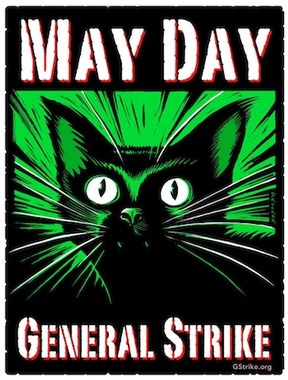|
By: Peter Gallagher  For a few brief moments on Tuesday, anarchy truly broke out in Seattle. Or at least it felt like it. The occasion was the May 1st General Strike, a day marked to disrupt the flow of capital in order to shed light on the daily injustices and atrocities that are wrought by our spiritually sick society. For me, it was a tragic day, yet very powerful and illuminating. Through writing this reflection, I hope to speak to what some implications might be for Christian anarchists. My experience leads me to believe that there is an immanent need for a soulful and reverent anarchist presence—and that we as followers of Jesus must abide by Jesus’ example of holy militancy: passionate, fearless, and present. May 1st 2012 is sure to go down as one of the most seismic and divisive days in Seattle’s recent history, perhaps since the WTO protests of 1999. The media had a field day; The Seattle Times carried a massive headline reading “Police move quickly to suppress anarchists”, accompanied by a full-page article with pictures of black-clad youth being towed off by cops. The story, according to them, was that on a day usually reserved for peacefully highlighting social justice causes, a violent faction of insurrectionary anarchists dressed in black—colloquially referred to as the “black bloc”—marred it by smashing up several banks, storefronts, fancy cars, and even the Federal Court of Appeals. This resulted in direct confrontation with the police, an executive order from the mayor to detain anyone carrying a large stick or flag, and numerous arrests. That, as I said, is their account. Now, I’d like to take you through a few personal experiences of my own that, while laden with violence and intensity, may be instructive for anarchists and followers of Jesus. The first incident occurred right as a group of anarchists broke the first windows at a Bank of America, which was happening much to most everybody’s shock. Immediately, a plainclothes man ran into the swirling fray of black clothes and long sticks, not to physically impede them, but to loudly and directly voice his disagreement their actions. Their reaction was shocking, and horrifying. Three of the black-clad anarchists immediately converged on the man and delivered sharp blows with their fists and long, wooden rods. They did a lot of damage in such a short amount of time, and could have seriously injured him, had two women not yanked him from the fray as I was running over. He had a large welt on his face, but it could have been a lot worse. His only words to me were, “I just don’t think they should be doing that.” So, in this instance, a number of self-proclaimed anarchists¬—the ones that the media focuses their attention onto—met dissent from fellow activists with spontaneous brutality. While this is not indicative of all who march with the black bloc, I do find this to be symptomatic of a praxis where damage and destruction are exercised without a spiritual center, or an abiding awareness of a Love that demands an ethical examination of tactics. Fits of anger and destruction thus become the primary means through which a better society will be realized. I find this to be deeply flawed, and perhaps even a direct impediment to the way of Jesus. Later that day, I witnessed another incredibly violent event, though of a different ilk. As I mentioned earlier, the mayor had issued an executive order calling for emergency powers for the police, allowing them to arrest anyone carrying an artifice they deemed could be used as a weapon. The cops abused this privilege, and arrested people liberally. As a result, tensions mounted, between the police and protesters until both groups stood opposite one another, battle lines drawn. Protesters screamed at the police for picking—off folks that had refused to relinquish their flags. Inevitably, the tension broke: one protester hurled a glass bottle at a cop in riot gear, which shattered on impact. Immediately, the spark ignited. Chaos ensued as the police broke their ranks, and three cops ran and tackled the man who had thrown the bottle. What followed may endure as one of the most disturbing images of my life. One of the cops pinned the man’s head to the ground with his knee, driving it into the sidewalk. His screams resonated even through the cacophony of what had deteriorated into a full-blown riot. We yelled at the cops to be gentle and release his head, especially as I saw his mouth tinged with red and spitting out blood. I bent down beneath the cops that were guarding those arresting him, and the man looked me right in the eyes, all agony and destitution. He screamed, “HELP ME!!! HELP ME!!!”, over and over again, speaking directly to me. He wailed something about a medical condition that I didn’t catch. I could have broken the cops’ ranks and been arrested in solidarity for his brutal treatment, and the thought crossed my mind. But I didn’t. Whether through lack of courage or better judgment, I’m not really sure. Either way, I’m working through a lot of guilt. I didn’t have time to dwell on the moment, though, as a few seconds later a friend of mine, who was completely beside himself with rage, began shoving police officers. As they tried to seize him in order to arrest him, I grabbed hold of my friend’s arm and engaged in a sick, human tug-of-war with the cops. Eventually, somehow, my friend ended up flying backwards about ten feet, crashing hard onto the cement, but away from the cops. After the pandemonium subsided and “order” was restored, we grimly marched back to our base camp. There were more marches that day, but this is where I’ll end my account of things. I was too tired and emotionally shot to manage much more after that. At that point, the desperate need to process and reflect had begun. What this day highlights, for me, is the urgent need for the proclamation of a spirited, militant presence within the greater folds of resistance to capitalism and empire. Opposition to the State’s penchant for oppressive violence—which was on clear display on May 1st—is a point of unity for all anarchists. But my experience has reinforced my conviction that the dominant anarchist factions do not seek to embody a holistic model of resistance that is grounded in a spiritual awakening. Instead, I believe that their vision of principles in practice distances us from collectively living into the will of God. Therefore, we Christians must cultivate and make known our alternative to empire by embodying the love that the world can neither give nor destroy, the love sanctified by Jesus’ life of militant resistance. But what is Jesus’ way of resistance? Where does He stand in these situations? I think what is abundantly clear through the story of Jesus’ life is that his message of love and his way of living were simply incompatible with imperial Roman society. So in order to truly emulate Jesus, our lives should also be unable to conform to the twisted norms of empire. But Jesus did not coerce, did not destroy, did not kill. Instead, He made known a love that is present and dynamic, from which beautiful resistance naturally arises. Therefore, our resistance must be holy, intimate, passionate resistance: as my friend Sue says, flowing from the intimacy and bonds forged through washing each other’s feet. One poignant example of Jesus’ militant resistance is his overturning of the moneychangers’ tables in the temple. This was raised by a friend as an example of how Jesus’ way might not be inconsistent with the bashing of windows and, generally, anger-driven property damage. For me, the difference lies in that, while driven by anger and holy disgust, Jesus’ actions were part of a greater narrative of a radically new, radically bold way Love being proclaimed through God’s enfleshed presence among us. In the context of the Gospel, Jesus’ cleansing of the temple has deep spiritual and political ramifications as to God’s judgment on economic exploitation, and God’s vision for an alternative. I don’t see the full spirit of Jesus’ holy militancy reflected in the black bloc’s actions. Maybe some of them do. But my doubts increase when their “holy rage” need be so fearfully defended by acts of repression. I think a more appropriate example of holy militancy is Daniel Berrigan’s burning of military draft records with napalm. Given the rampant use of napalm in the Vietnam War, this was both a deeply liturgical but also practically “destructive” act that crippled the U.S. military empire. And, from what I understand, it served as a rallying cry for the whole anti-war movement, helping to foster deeper bonds of solidarity and courage across boundaries of religion and ideology. Resistance can be militant and still reflect heaven as a lived reality. Jesus knew that only through personal sacrifice and laying down our own lives in singular allegiance to the God of Love can heavenly peace be achieved. Our dear Lord would not have us unite under the banner of “An injury to the oppressor is a victory for all” (as the black bloc does), but rather, in a boundless, indiscriminate love that sets the world aflame in its holy incompatibility with systems of oppression. So we must be steadfast in our own organizing, our own collaboration, and our own proclamation: both to our fellow radicals, and with the powers that be. All in the spirit of Love, with a vision of heaven too irresistible to relinquish. May 1st has come and gone, but there is more struggle and organizing yet to come, and we must be ready. We must begin the work now of forging alliances, deepening existing bonds and reaching out to create beloved communities of resistance. But perhaps most importantly, we must individually and collectively streamline our abiding allegiance to God alone, and God’s way alone. A particularly poignant quote for me right now is , “If you don’t start your own revolution, somebody else will start their own”. Theirs has started. Ours must begin as well. May God instill in us the righteous anger, courage, and fellowship to collectively embody the will of Christ through our participation in bold, unabashed and joyous insurrection. Amen.
Comments
|
Disclaimer
The viewpoints expressed in each reader-submitted article are the authors own, and not an “official Jesus Radicals” position. For more on our editorial policies, visit our submissions page. If you want to contact an author or you have questions, suggestions, or concerns, please contact us. CategoriesAll Accountability Advent Anarchism Animal Liberation Anthropocentrism Appropriation Biblical Exegesis Book Reviews Bread Capitalism Catholic Worker Christmas Civilization Community Complicity Confessing Cultural Hegemony Decolonization Direct Action Easter Economics Feminism Heteropatriarchy Immigration Imperialism Intersectionality Jesus Justice Lent Liberation Theology Love Mutual Liberation Nation-state Nonviolence Occupy Othering Pacifisim Peace Pedagogies Of Liberation Police Privilege Property Queer Racism Resistance Resurrection Sexuality Solidarity Speciesism Spiritual Practices Technology Temptation Veganism Violence War What We're Reading On . . . White Supremacy Zionism ContributorsNekeisha Alayna Alexis
Amaryah Armstrong Autumn Brown HH Brownsmith Jarrod Cochran Chelsea Collonge Keith Hebden Ric Hudgens Liza Minno Bloom Jocelyn Perry Eda Ruhiye Uca Joanna Shenk Nichola Torbett Mark VanSteenwyk Gregory Williams Archives
October 2017
|
Search by typing & pressing enter


 RSS Feed
RSS Feed